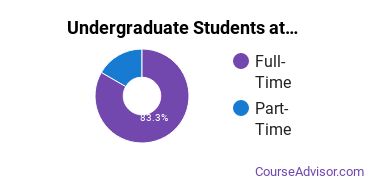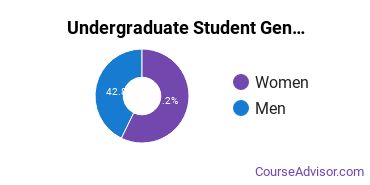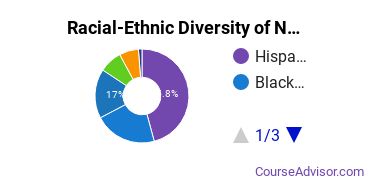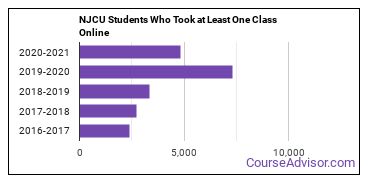New Jersey City University Overview
New Jersey City University is a public institution situated in Jersey City, New Jersey. The city atmosphere of Jersey City makes it a great place for students who enjoy having lots of educational and entertainment options.
What Is New Jersey City University Known For?
- The student loan default rate at NJCU is 4%, which is significantly lower than the national rate of 10.1%. That's great news for students who are worrying about paying off their student loans.
- The highest award offered at NJCU is the doctor's degree.
- For the <nil> academic year, 100% of the faculty were full-time.
- After graduation, NJCU bachelor's degree recipients go on to jobs where they make $50,417 a year. That's about 24% more than their peers at other schools.
Featured schools near , edit
Where Is New Jersey City University?

Contact details for NJCU are given below.
| Contact Details | |
|---|---|
| Address: | 2039 Kennedy Blvd, Jersey City, NJ 07305 |
| Phone: | 201-200-2000 |
| Website: | www.njcu.edu |
How Do I Get Into NJCU?
You can apply to NJCU online at: www.njcu.edu/admissions/apply
Admission Requirements for NJCU
| Submission | Required? |
|---|---|
| High School GPA | Required |
| High School Rank | Recommended |
| High School Transcript | Required |
| College Prep Program | Recommended |
| Recommendations | Required |
| SAT or ACT Scores | Considered but not required |
| TOEFL | Required |
How Hard Is It To Get Into NJCU?
Approximately 38% of accepted students are men and 62% are women. The acceptance rate for men is 88%, and the acceptance rate for women is 92%.
Average Test Scores
About 10% of students accepted to NJCU submitted their SAT scores. When looking at the 25th through the 75th percentile, SAT Evidence-Based Reading and Writing scores ranged between 440 and 570. Math scores were between 450 and 570.
Can I Afford New Jersey City University?
The net price is calculated by adding tuition, room, board and other costs and subtracting financial aid.
Student Loan Debt
It's not uncommon for college students to take out loans to pay for school. In fact, almost 66% of students nationwide depend at least partially on loans. At NJCU, approximately 35% of students took out student loans averaging $6,456 a year. That adds up to $25,824 over four years for those students.
The student loan default rate at NJCU is 4.2%. This is significantly lower than the national default rate of 10.1%, which is a good sign that you'll be able to pay back your student loans.
New Jersey City University Undergraduate Student Diversity

There are also 1,656 graduate students at the school.
Gender Diversity
Of the 4,385 full-time undergraduates at NJCU, 43% are male and 57% are female.

Racial-Ethnic Diversity
The racial-ethnic breakdown of New Jersey City University students is as follows.

| Race/Ethnicity | Number of Grads |
|---|---|
| Asian | 345 |
| Black or African American | 943 |
| Hispanic or Latino | 2,008 |
| White | 744 |
| International Students | 54 |
| Other Races/Ethnicities | 291 |
Geographic Diversity
New Jersey students aren't the only ones who study at New Jersey City University. At this time, 11 states are represented by the student population at the school.
Over 46 countries are represented at NJCU. The most popular countries sending students to the school are Brazil, China, and India.
Online Learning at New Jersey City University
The following chart shows how the online learning population at NJCU has changed over the last few years.

This school is the 13th most popular in New Jersey for online learning according to the online graduations recorded by the Department of Education for the academic year 2020-2021.
Online Growth Rankings of NJCU
The average growth rate over the last four years of online students at New Jersey City University was 78.9%. This is the #489 largest growth rate of all schools that are mostly online. This refers to all students at NJCU regardless of major.
When we speak of partially online, we are referring to schools whose online population is less than 50% of its total student body. Mostly online refers to those with online populations greater than or equal to 50%.
References
*The racial-ethnic minorities count is calculated by taking the total number of students and subtracting white students, international students, and students whose race/ethnicity was unknown. This number is then divided by the total number of students at the school to obtain the racial-ethnic minorities percentage.
- College Factual
- National Center for Education Statistics
- Image Credit: By Stepanstas under License
More about our data sources and methodologies.
Featured Schools
 Request Info
Request Info
|
Southern New Hampshire University You have goals. Southern New Hampshire University can help you get there. Whether you need a bachelor's degree to get into a career or want a master's degree to move up in your current career, SNHU has an online program for you. Find your degree from over 200 online programs. Learn More > |
